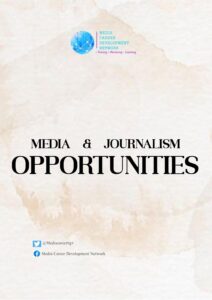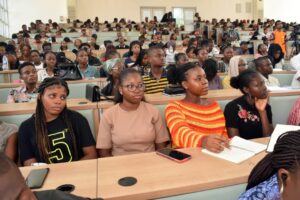Chairperson of the Nigeria Association of Women Journalists, Akwa Ibom State Council, Comrade Uduak Ekong at an empowerment training for female journalists in the state organised by Imaobong Akpabio Dem of Inspiration FM, Uyo spoke on mainstreaming women issues in the media.
She also shared her early experience in the profession and offered tips on how women can excel in the profession.
Growing up as a young girl, I remember that the films we watched portrayed stereotypes of women as cooks and homemakers. We also noticed that the dishes were left for the girls to wash while the boys played soccer.
The media always agreed that those were the roles prescribed for women. Over the years, we came to realize that those were not just the roles women should take up, even in the homes.
When I came into the journalism profession, by default, I wanted to be a lawyer but I could not gain admission. My father advised that while I was at home, I could attend a polytechnic at Calabar. I studied mass communication at the polytechnic. Normally at the polytechnic, you will do an industrial attachment. This brought me to Akwa Ibom State Broadcasting Corporation (AKBC) Radio in 1990 where I did my three months industrial attachment. I went back to Ekpo Abasi in Calabar, completed a Diploma and went on to also work with the television arm of the AKBC for one year.
I was at my last month when I got an offer of employment in AKBC. I turned it down and decided not to work, but go back to school. I had a group of mentors who called me into a small office and talked to me. Unknown to me, because I was quite young, I did not know that the process of employment was quite tedious. I said I wanted to go to school, but they told me of several people in AKBC who were going to school and working at the same time. So, they encouraged me to take up the employment and after much talk, I took up the employment, and here I am.
In those early years, I noticed that women in the newsroom were assigned to cover children, health, and women. I became very curious. I did not go to the University of Uyo, until 1996. I had stayed for two years and by then I told myself I did not need to read law anymore but go into journalism. So, I went in and studied Communication Arts.
READ ALSO How to protect female journalists against sexual harassment, discrimination
What struck me was the disparity in the newsrooms. If there was anything that concerned the women, such as women’s rallies and so on, few women in the newsroom will be selected to cover. This was happening and I discovered that on the Pioneer newspaper, the women’s pages were health, children and fashion, while the men wrote on the features and politics. I was ambitious, but I didn’t know. I was learning certain things and absorbing them so much like a sponge. I am telling this story so that the women can relate to it.
I got married and I was sent to cover the office of the governor’s wife. Then, my first son was just a baby and I was pregnant with the second one. I stayed with the governor’s wife for six and a half years. I covered the activities of Late Alison Attah. In those years, there were some issues that occurred as another reporter was to be sent to cover His Excellency and the reporter that was there was still being managed because there was no replacement. Something happened, someone had to be removed and another put there. There were questions on whom will be sent to cover His Excellency. I heard this news much later and because of the stereotypes, I was not permitted to go for the coverage, until one beautiful day, I was called, given a letter and immediately, I started work.
There was much trouble that came with it. I happened to be the first female sent by my office to cover the Governor since the creation of the state. Something very interesting happened. We travelled to Abuja and His Excellency was to give a speech about Resource control. I was there as a correspondent. While I was in the hall, I noticed that there was a crew from the African Independent Television (AIT). I walked up to them and asked if they were going to make the event live, and they replied positively. I put a call across to my editor to inform him that the Governor will be going live on AIT and if it were possible for them to record what the Governor would say while I send in a story that will be edited and aired in Akwa Ibom.
I happened to have an editor then who believed in me and that I could deliver, so, he gave me the chance. I sat in Abuja, while others were busy eating, I was writing my story. A man walked up to me and asked me why I was so serious and not joining others to gist, after all, I was to return to Akwa Ibom the next day. I told him “my story will come out this night.” I didn’t actually know how it would happen but I knew it was possible. He asked me how I would do that, I told him that I will read it and have someone record my speech, write it out and get it packaged. Pastor Etop Imah gave me a phone, and I told him I would take so much of his call card. He was using one of the most expensive phones then and I did not even have one.
I got to know later that Pastor Imah was a personal Aide to the Governor.
I sent the intro and the voice over of the story. I took almost thirty minutes to send the stories to my editor for reporting.
By 8 pm, the headline was on the news;
“Governor Obong Victor Attah gives resource control as a solution to Nigeria’s problems”. People started thinking about how it was possible for AKBC to carry the news that occurred that day. My name was called, and I filed in the story. Till today, that has been a reference point. This means that we women can do much more than is thought of us.
When I returned from Abuja, everyone was curious about how it happened. It had never been done, but I did it and everyone kept talking about it. When Governor Akpabio came in, he said since I was loyal to the former governor, I will not be loyal to him. I was sent back to the newsroom.
When I got back, my status changed because I became that girl that did something no one would have ever thought of. Every day, I discovered that a lot more was expected from me. So as a woman in this profession much more is expected. A woman has to do triple of what the men do to be acknowledged. I gradually started developing myself. Everything I know about this job, I’ve learnt.
I remember being sent to the House of Assembly in 2017. I was carried like a fish from the river to dry land but I learnt how to survive on dry land. I was taken out of the newsroom and dumped there in the House of Assembly. I didn’t know the terminologies or anything. I called my editor and reported that I knew nothing about the House of Assembly due to its technicality and the person who I took over from was so angry that he was removed and wouldn’t teach me anything. I immediately went to Google to check how to report for the legislature and I also watched the NTA news to learn the terminologies.
With this, I learnt how to report and compare my report with various news stations. I got myself abreast with the happenings as a broadcast journalist and developed my mindset. After my training with all these stations, I was reporting well. We keep saying that women are not doing well and that they are not seen. An average woman runs away from the camera. For instance, you try to interview a woman and she shies away, but the men come voluntarily to be heard. I have discovered that when women are given the opportunity to talk during training, they have so much to say and it puts them at ease. It is the stereotype that they are not good enough in public that rings in their heads and the lack of self-expression.
How do we help women in the media?
We need to start telling stories of women and their exploits. International Day of the Girl child is coming up on October 11th and it’s exciting that it will focus on young girls in technology. I got some chairpersons of NAWOJ in the South-South to look at the possibility of doing something about the girls in our different states in the tech world. In as much as I am not really good in tech, I can learn and I have children who need the exposure and sometimes they make me feel inadequate.
In Akwa Ibom, there are female technicians. I never knew they existed until I put a call across to a tech guy Hanson Johnson and got to know that there was an ongoing event called Akwa Ibom tech week. Actually, it is not what you have that limits you, it is what you have and cannot use that limits you.
Lastly, I say that women should not be deprived of the experience to do serious works people feel are meant for men. I am looking at specialized reporting now and not just reporting government which requires who said what, when, where, why and how. I am looking at reporting real-life events and not talking from speeches which anyone can do. When you find out a situation and talk about that situation, then you can give yourself thumbs up.
I need a lot of patience to make a woman express herself. There is nothing bad in correcting a woman in her speech and allowing her to do better. There are many female public office holders we do not know about because they are not publicity conscious, but we can work together to bring them out.
***UDUAK EKONG IS THE CHAIRPERSON OF NAWOJ IN AKWA IBOM STATE WHOSE TENURE ENDS MARCH 2022.



